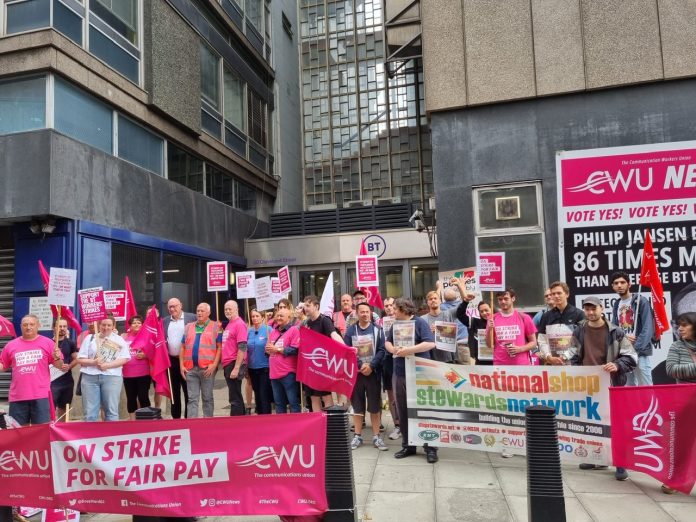Socialist party members in CWU
The Communication Workers Union (CWU) has negotiated a provisional agreement with BT, Openreach and EE, which the union’s leadership and telecoms executive believe is sufficient to end the long-running pay dispute.
The pay offer provides for a £1,500 flat-rate increase payable from 1 January 2023, in addition to the £1,500 already paid to members without agreement in April. Both of these sums are consolidated for pensions and allowances.
This will give the lowest grades rises of between just under 10% and 15% over a 17-month period. Next year’s pay rise will not take effect until September, to allow for negotiations to be concluded around unresolved pay and grading issues. Pay revisions will revert to April from 2024.
There will be varying views on the offer, although there is anger that it is not backdated to the April anniversary date.
Many members will see this as an offer which could be accepted, and also a vindication of the industrial action taken so far.
However, some of the longest-serving members who are on old BT contracts, with higher rates of pay, will see a pay rise notably under the current rate of RPI inflation, and may well feel that the offer should be rejected.
This is the danger with a flat-rate pay increase, and why there should have been a common percentage rise.
Socialist Party members in the CWU opposed the moves to a ‘two-tier’ workforce. This was because lower-paid ‘new entrant’ contracts have the potential to cause dangerous divisions among members, which management can exploit, as shown by the different responses to this pay offer.
However, the industrial action has brought all workers together in a united struggle, and should be the platform to mount a serious campaign to bring workers together onto the higher tier of pay, terms and conditions.
Also, the union must continue to campaign for BT to be renationalised.
BT workers need to take stock of what the dispute has achieved to date. It has forced the employer to make a consolidated pay offer that it said was unaffordable, and to offer far more money than originally intended. It has also blooded a new generation of CWU activists in industrial action which will bode well for the union in the future.
If the offer is rejected, Socialist Party members will be offering full support for a continued struggle. There would have to be a serious escalation of the dispute, including coordination with CWU members in Royal Mail and the Post Office, and the wider union movement.
CWU members will now vote on the offer, although there is concern that there should have been more time allowed for members to properly discuss and consider it. Despite genuine issues, this pay offer, wrung from BT, should give encouragement to the CWU’s postal members that, despite what Royal Mail CEO Simon Thompson says, strike action is effective.







